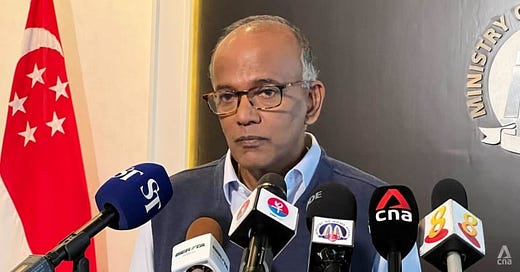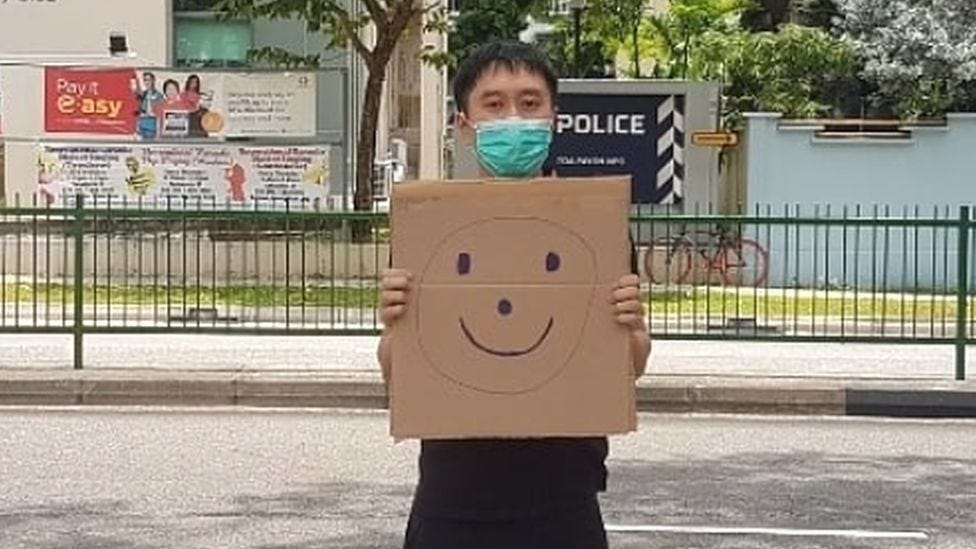
The Singapore government on July 7 implemented a new law aimed at a problem that doesn’t appear to exist, unless you count political philanthropist George Soros: alleged attempts by foreign interests to interfere in the island republic’s domestic politics.
The best the government could do to show such foreign interference was to describe a recent dispute with Malaysia over maritime and airspace issues, when there was a "curious" spike in online comments critical of Singapore on social media. Supposedly the posts were made using what are "essentially" anonymous accounts, the home affairs ministry said.
More recently, the government-dominated daily Straits Times said, “observers have cautioned against attempts by foreign actors worldwide to sway sentiments over Russia's ongoing invasion of Ukraine, including through the use of social media platforms such as Twitter and Facebook,” although what that has to do with Singapore domestic politics wasn’t explained.
The parliament approved the “Foreign Interference (Countermeasures) Act, or FICA at the behest of Home Affairs Minister K Shanmugam (pictured, above) last October but has waited until now to implement it. Human rights and press organizations fear it is aimed at suppressing dissent in a country that already is tightly wound against critics through a repressive fake news law passed two years ago, and other legislation, not to mention the ever-present threat of defamation suits and contempt of court actions that have cowed both the foreign press with interests in the country and local activists.
The provisions of the act allow the government to order Internet service providers and social media platforms such as Google, Facebook, and Twitter to divulge information on users, block content, and remove apps supposedly used to spread content the government deems to be hostile. It also allows the government to designate potential critics as “politically significant persons” – who face the danger of being named in the local press – requiring them to disclose the sources of any foreign funding over S$10,000 – read Soros, who helped to fund a local publication, The New Naratif, which has since been put out of business by the authorities – and subject them to other “countermeasures” to reduce the risk of overseas interference.
Among other things, foreigners now are barred from volunteering at “Meet-the-People” sessions for parliamentary candidates or community outreach programs. The government will also set its own parameters on who will be labeled a ‘foreign agent’ and will have the authority to impose stiff sentences for the intent to publish content. It also appears to allow the government to introduce a system of prior censorship.
The law has been universally condemned by press and human rights organizations including the International Federation of Journalists, which called its passage a “grave blow against press freedom in Singapore, with independent journalists and media workers in the firing line. Critical voices and independent reporting must not be stifled. The IFJ condemns the new legislation and calls on Singapore’s government to provide greater clarity over the scope and implementation of the FICA.”
The Paris-based Reporters Sans Frontiers called the measure a “legal monstrosity with totalitarian leanings.” What with its “extremely vague definitions, pervasive arbitrary approach and lack of independent legal recourse for those who are given orders by the government, the FICA bill is an abomination both from a purely legal viewpoint and as regards respect for fundamental rights,” said Daniel Bastard, the head of RSF’s Asia-Pacific desk.
Other critics say the measure is aimed at those practicing domestic legitimate civil activities at the behest of the People’s Action Party and the Lee dynasty, which has ruled the country since independence from Great Britain, and which seems determined to stay in power indefinitely in ways both serious and silly, although both appear increasingly unsure of their dominance.
For instance, last week, two activists holding a vigil outside Changi Prison for a drug mule who was being hanged – the seventh this year – were interrogated by police for wearing T-shirts bearing slogans deemed subversive. They were at first accused of holding an illegal procession although there were only two of them crossing a street. Although the attorney general later said the duo hadn’t broken the law, they were ordered to remove the offending garments while a colleague was sent to buy them new T-shirts. In 2020, a young civil rights activist named Jovolan Wham was charged with illegal public assembly for holding up a cardboard sign with a smiley face on it near a police station. Wham said he was holding up the sign, which he had drawn himself, in support of two climate activists who had been summoned for questioning.
In a statement on its website, the Home Affairs Ministry said foreign interference “may take the form of foreign actors seeking to manipulate our domestic politics, including through covert and deceptive means, to undermine our political sovereignty and harm our social cohesion. In recent times, the threat of foreign interference has risen in potential and severity because of the internet and social media.”
Hostile foreign actors can deploy a sophisticated range of tools and tactics to interfere in domestic political discourse, incite social tensions and undermine our sovereignty. These include but are not limited to creating and using inauthentic accounts to mislead users about their identity and credibility, using bots on social media platforms or taking out advertisements to artificially boost the reach of these messages, using inauthentic accounts and bots in combination to engineer an artificial sense that there is strong public support or opposition to a certain position or sentiment.”
Phil Robertson, deputy Asia director for Human Rights Watch, at the time of passage last year, said Singapore “is preparing the political equivalent of a lynching party to go after the few remaining political activists, community organizers, and independent media outlets, using claims of foreign involvement to disguise this blatant repression. Basically, Singapore’s ruling party has decided that it must eradicate any remaining political threat to its power, and it will use ‘foreign influence’ as the bogeyman to justify the surveillance, discriminatory targeting, and violations of civil and political rights to follow.”
Last year, the government put a mildly critical website called The Online Citizen out of business. With five young Malaysian citizens as reporters, the publication was squarely in the government’s sights as “influenced by foreigners.” Another new media entity was the New Naratif website, also Singapore-based, which covered Southeast Asia and whose editor, Thum Ping Tjin, received “stern warnings” from the government about “illegal election activity.” He has since left the country and is teaching at a university in the Philippines.
Ranked 160th of 180 countries in RSF's 2021 World Press Freedom Index, Singapore has been colored black on the RSF press freedom map since 2020 as the situation is now classified as “very bad,” in part because of the draconian anti-fake news law adopted in 2019.







